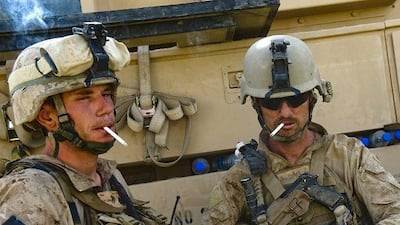WASHINGTON // The image of an American GI with a cigarette dangling from his lips, or a pack of Marlboros strapped to his helmet, could one day be a thing of the past as the US military mulls over the negative health effects of smoking and considers a ban on the use of tobacco products. But do not expect such a ban to come anytime soon. A Pentagon spokesman this week said Robert Gates, the US secretary of defence, had no plans to prohibit US soldiers, currently engaged in two foreign wars, from lighting up.
Mr Gates "knows that the situation they are confronting is stressful enough as it is, and I don't think he is interested in adding to their stress levels by taking away one of the few outlets they may have to relieve stress," Geoff Morrell, the Pentagon press secretary, said last week during a briefing with reporters. "It's not our preference to have a force that is using tobacco products. It's enormously expensive," he added, citing reports showing that health-related costs may be close to US$1 billion (Dh3.67bn).
However, the secretary of defence "is not prepared ... to restrict the use of tobacco products in combat zones". Last month, an Institute of Medicine report, requested by the Pentagon and the Department of Veterans Affairs (VA), showed that about one third of active-duty military personnel use tobacco, compared to just a fifth of civilians. Smoking rates among military personnel returning from Iraq and Afghanistan may be 50 per cent higher than rates among non-deployed military personnel, the report showed, noting that the habits harm "operational readiness".
In 2008, the VA spent more than $5bn to treat veterans with chronic, obstructive pulmonary disease, which the report says is "strongly associated with tobacco use". The defence department spent $564 million in 2006 treating tobacco-related illness in the military, the findings showed. The report suggested the military gradually institute anti-tobacco measures such as ending discounts on tobacco products at military commissaries and exchanges, and ultimately ban the sale of the products altogether. It also recommended that the military prohibit the use of tobacco on military installations.
Such restrictions would be the latest anti-tobacco measures in the United States, where in recent years major cities have banned smoking in enclosed public places such as restaurants, bars and airports. In April, the federal government put a 62-cent tax hike on cigarettes, the largest-ever single increase. Last month Congress voted to give the Food and Drug Administration broad powers to regulate the tobacco industry, allowing it to control everything from the ingredients of cigarettes to the marketing of certain brands.
But some say forcing tobacco restrictions on US soldiers, who are grappling with the rigours of war, is simply going too far. "With all the issues facing our military today and the risks our troops take to protect our freedom, banning smoking should not even be on the radar screen," Brian Wise, the executive director of Military Families United, a national military family organisation, said last week.
"Nobody doubts the effects of smoking but it is not an illegal substance and should not be banned. Our troops make enough sacrifices to serve our nation," he added. "Perhaps more than anything, smoking in the field is more about comfort and coping with an often hostile environment." There was no comment last week from the White House, where Barack Obama, the US president, is going through his own battle with nicotine addiction. Mr Obama refers to himself as a "former smoker", but also admits to occasionally indulging his habit. "I would say that I am 95 per cent cured, but ? there are times where I mess up," he told reporters in a news conference last month.
The new report on military smoking acknowledged the difficulty of instituting a long-term smoking ban, noting that the habit had "long been associated with the image of a tough, fearless warrior". "By the end of World War I, tobacco use was collectively viewed as patriotic and as a staple for the American soldier," the report said. It also cited some recent positive changes in the "culture of smoking" and applauded a 1987 ban on tobacco use during basic training. Still, it concluded: "The time has come for DOD and VA to assign high priority to tobacco control."
sstanek@thenational.ae

